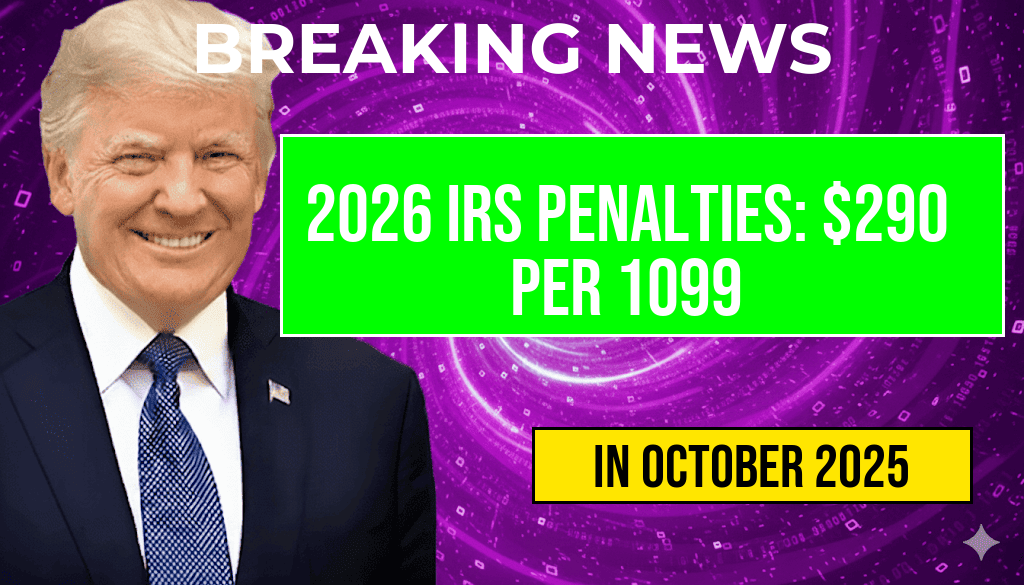IRS Announces 2026 Penalties for Missing 1099 Forms: Up to $290 per Form
Taxpayers and businesses should prepare for significant penalties related to missing or late-filed Form 1099 submissions in the upcoming 2026 tax year. The Internal Revenue Service (IRS) has clarified that failure to file correct 1099 forms or submit them on time may result in fines of up to $290 per form. This escalation underscores the agency’s ongoing efforts to enforce reporting compliance and tighten oversight over income reporting for independent contractors, freelancers, and other payees. With the threshold for penalties holding steady, taxpayers need to understand the scope of these fines, the circumstances under which they apply, and the steps to ensure adherence. As digital reporting requirements increase, understanding these penalties helps both small business owners and individual earners avoid costly mistakes that could impact their financial health.
Understanding the 1099 Reporting Framework
The Form 1099 series is crucial for reporting various types of income outside traditional employment, including freelance work, rental income, dividends, and other miscellaneous payments. The most common version, Form 1099-NEC, is used to report nonemployee compensation paid to independent contractors. The IRS mandates that businesses and payers submit these forms to both the recipient and the IRS by January 31 following the tax year. Failure to do so timely or accurately triggers penalties, which have been increasing steadily in recent years to promote better compliance.
Details of the 2026 Penalty Structure
| Violation Type | Penalty per Form | Maximum Penalty per Year |
|---|---|---|
| Failure to file on time without reasonable cause | $290 | Up to $3 million for small businesses |
| Incorrect or incomplete information | $290 | Same as above |
| Willful neglect or intentional disregard | Up to $580 per form in some cases | Unlimited potential fines |
For most taxpayers, the $290 fine applies when a Form 1099 is missing, late, or inaccurately filed without a reasonable cause. The IRS emphasizes that consistent non-compliance can lead to substantial financial penalties, especially for larger reporting volumes, underscoring the importance of accurate recordkeeping and timely submissions.
Who Is Affected by These Penalties?
Small business owners, freelance professionals, and organizations that make payments to independent contractors or vendors must be particularly vigilant. The new penalty thresholds extend to entities that pay more than $600 annually to a payee, requiring the issuance of the appropriate 1099 form. Failure to file or filing incorrect forms can result in fines, even if the payer did not intend to evade taxes. Additionally, individual taxpayers who receive payments reported via 1099 forms should verify their records for accuracy to avoid discrepancies that could trigger IRS audits or penalties.
How to Avoid Penalties Before the 2026 Tax Year
- Maintain meticulous records: Track all payments made to contractors and vendors, ensuring documentation aligns with reported figures.
- Use reliable software: Employ IRS-approved accounting tools that facilitate accurate 1099 generation and electronic filing.
- Meet deadlines: Submit forms by the January 31 deadline to avoid late filing penalties.
- Correct errors promptly: If mistakes are identified, file corrected forms quickly to minimize penalties.
- Consult professionals: Engage tax advisors or accountants familiar with IRS reporting requirements to ensure compliance.
Implications for Taxpayers and Businesses
The IRS’s increased penalties for missing or incorrect Form 1099 submissions serve as a reminder that compliance is critical in the evolving landscape of tax reporting. For 2026, entities that neglect these responsibilities risk hefty fines that can accumulate quickly, especially when multiple forms are involved. The agency’s focus on enforcement aligns with broader efforts to curb tax evasion and improve transparency in income reporting.
Taxpayers should stay informed on IRS updates and legislation related to reporting requirements. Resources such as the official IRS website provide guidance on filing procedures and deadlines. Businesses and individuals alike must prioritize accurate, timely submissions to avoid penalties and ensure compliance with federal tax laws.
As the IRS prepares for the 2026 tax season, awareness of these penalties can help prevent costly mistakes. Staying proactive and organized in reporting practices will be essential for avoiding the potential $290 fine per missing form, safeguarding financial stability and avoiding unnecessary legal complications.
Frequently Asked Questions
Question
What is the penalty for missing a 1099 form submission in 2026?
Question
How much is the IRS fine per missing 1099 form in 2026?
Question
Who is responsible for submitting 1099 forms to the IRS?
Question
Are there any exceptions or waivers for missing a 1099 form?
Question
What steps can businesses take to avoid IRS penalties related to 1099 forms in 2026?

Leave a Reply